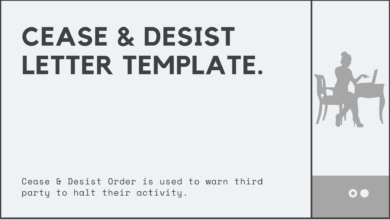
The cease and desist letter is sent by a person or a company to the other party breaching an agreement or carrying out an illegal act or any objectionable activity, in order to warn them to stop that activity (“Cease”) in specified time duration, and not to begin it again (“Desist”), otherwise the sender of cease and desist order may sue the recipient.
What is a Cease and Desist letter?
Within the legal world, when it is considered that a certain company or person is carrying out an illegal activity or breaking an agreement clause and therefore it is intended to prevent the normal development of the same, a letter of cease and desist is sent. The letter will contain a warning to the company or person. In the event that the activity does not cease, within the period established in the letter, they may be legally sued.
Is the presence of a lawyer necessary to carry out a letter of cease and desist?
Of course, it is not necessary. Anyone can be in charge of drafting a letter of cease and desist. It does not matter if it is properly funded or not. In any case, it is not a bad idea to consult a lawyer specialized in copyright, in order to corroborate that it is well written and correctly founded.
What is the meaning of the cease and desist letter of harassment?
As we said before, the main purpose of a cease and desist letter is to prevent the development of the alleged illegal activity. This letter can also be used to intimidate anyone who has harassed someone else.
What authorities are competent to issue a cease and desist order?
First, the relevant authority to be issued within the case must be sure that the evidence is sufficient and that there are clear grounds for believing that illegal activity is being carried out. Having made sure of this, they may issue a cease and desist order.
Cease and desist letter. What is it?
The cease and desist letter is nothing more than a simple warning to a company or individual. This is not a formal demand. It will simply warn you that, if you continue the illegal activity in question, you may face sanctions as a result of your behavior. A common reason for sending a cease and desist letter is patent infringement.
Intellectual property may be infringed in the following ways:
- Exactly copy of a third party’s work.
- Use a certain invention, without the approval of the creator.
- Carry out illegal activities through the work of third parties.
The first thing to do in these situations is to send the letter of cease and desist. In this way, the offender will be notified of the illegal activities he is committing. Some common names that can be given to the letter of cease and desist are:
- Stopping the harassment letter.
- Cease and desist measure,
- Cessation and desist of notification.
- Letter of demand.
What uses can be given to a cease and desist letter?
The most common situations through which people usually send this type of letter are:
- Trademark
- Copyright
- Violations in the design or utility of patents.
- Infringement in a non-competition agreement.
- Violation of a contract.
Persons who have contributed to illegal activity but have not participated directly in it may also receive a letter of cease and desist. These people will have what is known as a secondary responsibility.
When should a cease and desist letter be sent?
The cease and desist letter should be used when you want to give someone a formal warning and intimidate them to stop doing illegal harassment, misuse of property, misuse of trademarks, among others.
This letter is usually sent after the person has already made an informal notification. In most cases, these situations are dealt with informally. If not, the letter is the next step. This is the previous step to initiate more important legal actions.
What information should be included in the cease and desist letter?
Although each cease and desist letter is different in content, the following information is generally placed:
- Name and contact of the person sending the letter.
- Name and contact of the receiver of the letter.
- Clear information detailing the actions that are considered illegal.
- The first warning regarding future legal action.
- A lawsuit to stop the illegal activity.
- 10-15 days for the person to respond to the notice.
If the letter is used against a collection agency, ideally detail all the movements and debts they are trying to collect. On the other hand, when we are talking about patents, copyrights, and trademarks, it is convenient to include them:
- On what date and under what circumstances the violation occurred.
- What is the property?
- Documentary proof that you are the owner of the property.
- The possible future consequences that the infringer could suffer.
If we are talking about harassment cease and desist letter or order, we must include:
- On what date the harassment of the person began.
- Information detailing any harassment situation that has occurred.
- Deadline for a response, before further legal action is taken.
The more details you can put in your harassment letter, the better. Also, make sure the recipient receives the letter and signs it.
Is it necessary to hire a lawyer to send a Cease & Desist Letter?
Not at all. Cessation and desist letters are something anyone can do since they do not mean a legal order.
For a cease and desist order. Do I need a lawyer?
In this case, yes. Because the cease and desist order is a legal document. It is the first step in the filing of a lawsuit against a person or a company.
What issues should be included in a Cease & Desist Letter?
You have the option to use our cease and desist template or while composing a cease and desist letter you need to detail:
- The rights you are trying to assert.
- How your rights were violated.
- Petition to stop the illegal activity.
Before a lawsuit. Is a cease and desist letter necessary?
Absolutely not. If you wish, you can go directly to the lawsuit. All will depend on what you are claiming. If it’s a minor claim, a letter might solve it. If it is not, you may need to file a formal lawsuit.

